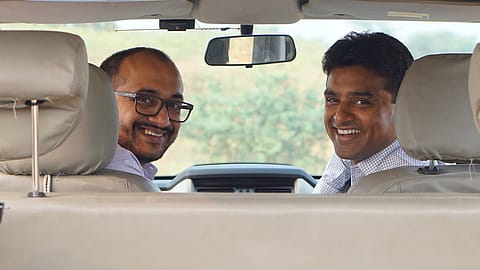Indians are moving away from car ownership: Revv
The Hyundai Motors-backed shared mobility service says that it’s not like all car buying customers will move to pay-per-use model but the adoption will keep on increasing.

Anupam Agarwal and Karan Jain, co-founders of shared-mobility service Revv, are confident about the growth potential of the industry in India. Agarwal says there is a lot of momentum to be seen on the ground. Hyundai Motors-backed Revv’s latest offering, OPEN, a long-term car subscription service, has got more than 300 subscriptions since its launch in December. In an interview with Fortune India, the ex-McKinsey executives spoke about OPEN and how it can help achieve the company’s growth plans. Agarwal says the company is looking at increasing its annualised revenue run rate to $100 million from $15 million in the next 12-18 months.
Edited excerpts:
How do you look at the car-sharing industry in India today?
Agarwal: We see a lot of momentum picking up in this space. Lots of action is happening on the ground. And that’s not only pertinent to India but also across the globe. I think there are more and more people who want to move from classical ownership to subscription. Therefore, the pay-per-use model in our minds is what is going to be the future. It’s happening much more globally and it’s only catching up in India. India is a country with only 2% car penetration, there is a real opportunity for us to step ahead and make that change happen much like what happened in the telecom space. People will get a car for as long as they need it and will move away from being committed to that car for five-six years.
In India, car ownership is an emotional issue. How difficult is it to break that barrier?
Jain: Within five years, we have seen that dramatic behaviour shifts. We used to say that Indians won’t buy apparel online or order food online. There is a growing community of people who don’t want to own a home now. A car is somewhere between e-commerce and home. The first change that might happen is not in their first cars but the second and the third cars. It’s not like all car buying customers will move to pay-per-use model. But the adoption will keep on increasing.
Tell me how your subscription platform OPEN works.
Recommended Stories
Jain: So pay-per-use models for cars in India is very analogous to the shampoo industry. Some 30 years back, shampoos as a category were not taking off in India. And somebody in this FMCG industry came up with an idea that a ₹100 shampoo bottle is not something that Indians are going to purchase. So, they made sachets. Even today, some 80-90% of the shampoo industry revenue comes from it. Similarly, we provide a two month or a two-year sachet depending on the amount required. Here, affordability is a challenge. A vast majority still can’t afford the EMI and down payment on the car. For subscription, the range varies from ₹15,000 a month to ₹40,000 for more expensive cars. This car will be fresh out of the showroom and the colour choice will all be customers’ with zero down payment involved.
OPEN already has 300-plus subscriptions since its launch in December. What are your growth plans?
Agarwal: Our first immediate priority is to scale up rapidly. We’re today doing an annualised revenue run rate of about $15 million. In the next 12-18 months, we need to get that number to 100. It would entail us going deeper in the cities that we’re already in but also expanding geographically. It will entail us expanding our fleet substantially, us launching new products. It will also entail a lot of investment from our side for developing the right technology platform. For the next 12 months, we want to focus on India before we start expanding into international territories.
Even your competition like Zoomcar is into subscription-based offering. How do you set yourself apart?
(INR CR)
Jain: If you are to point out differences in the product, we can have many such differences listed out. Even today there is no other product in India that promises you a brand new car. All other brands wherever you go for subscription will tell you it’s a well-maintained car. Product differences and business model differences are very easy to replicate. They are not really long-term differentiators. We believe there is only one long-term differentiator which is the customer experience part. How flawlessly is our service being delivered is something that we’re maniacal about. When we started out, car-sharing used to be a very parking lot based concept where you had to go and to pick up a car. Our constant focus is on compressing the delivery time. Because that opens up a whole new market of what we call the impulse purchase. If it’s 50 minutes today, we want to reduce it to 15 minutes. That’s the market that as an industry, we’re totally missing out on.